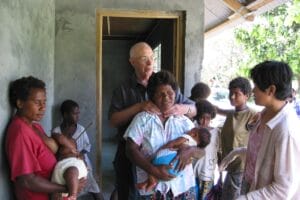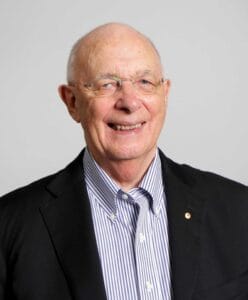A doctor, Eastman specialized in endocrinology — the study and treatment of hormonal disorders, such as diabetes and thyroid conditions. He started his practice in New South Wales, Australia, in 1965, working both at a hospital with patients, and as a Research Fellow at The Garvan Institute of Medical Research. In the 1970s, Dr. Eastman traveled to Malaysia to look into why a large percentage of rural villagers had goiters — a swelling in the neck from enlarged thyroid glands. It was already well known that insufficient iodine in the diet leads to goiters: the U.S. started adding iodine to salt in 1924 to prevent the malady, which was very successful. Eastman suggested adding iodine to the local drinking water to begin treatment immediately. The goiters were gone within a year, so the Malaysian government ordered that only iodized salt could be sold in the region.

Goiters are just one obvious result of Iodine Deficiency Disorder; “cretinism” is another: a birth defect marked by impaired physical and mental development. It’s better known today by its modern name, congenital iodine deficiency syndrome. The average person only needs a teaspoon of iodine over their lifetime, Eastman would teach his students, but it needs to be delivered pretty much daily in very tiny doses, which is why iodizing salt works well. Eastman continued to travel and spread the same message in rural areas of other countries, most notably Laos, Thailand, Vietnam, Indonesia, China, and Tibet. His work in China, especially, led to him being dubbed “the man who saved a million brains.” This was probably an understatement: he even needed to spread the message to Australian children, particularly to its Indigenous population.

But it wasn’t always that way: his research found that for instance, in the 1950s and 60s, Australian children got plenty of iodine from an unexpected source: dairies disinfected equipment used to process milk with iodine, and the tiny amount that got into the milk prevented IDD, making milk an “unexpected health hero.” But in the 1990s, the industry switched to chlorine as its disinfectant, and “We were shocked to see a sudden drop in iodine levels in the population that we had monitored for 20 years,” Dr. Eastman said. IDD, including the incidence of goiter, increased; the government responded by requiring bread-makers to use iodized salt.

And where did all this come from? Not just research: “I had that aha moment where I thought, ‘What’s the point of just doing research? Research has to be translated into public health action’. From then on, I started a new mission.” Dr. Eastman was made an Officer of the Order of Australia in 2018, the country’s highest civilian honor. “When he passed away, on his bedside table was an article on neonatal health and iodine, and his little green marker was there — working till the end,” said his daughter, Kate Eastman. “His life was devoted to the service of the health of others.” Dr. Creswell John “Cres” Eastman died May 17 at his home in Sydney, NSW. He was 85.
